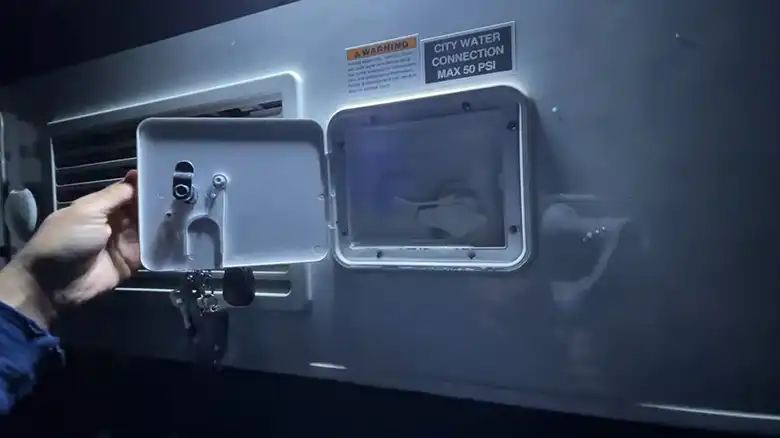RV water heaters provide hot water while out on the road using either an electric ignition or continuous pilot light. Both systems have advantages and disadvantages in terms of convenience, energy use, and operating costs that are useful to understand. This article offers an overview of the key pros and cons of electric and pilot light RV water heater ignition types.
RV water heaters typically are powered either by liquid propane with a pilot light that is always on or use an electric starter to light the burner as needed. The continuous small flame of a pilot light provides an instant supply of hot water. Electric ignition only activates to ignite the propane burner when hot water is needed, avoiding gas use between uses.
By weighing choices like energy efficiency versus water access convenience, safety considerations, operating noise, reliability in various weather conditions, and upfront purchase price, RV owners can identify if a pilot light or electric ignition RV water heater better matches their intended travel plans and budget. Key differences are covered further throughout the piece.

How RV Water Heater Ignition Works
RV water heaters provide hot water on demand using either a pilot light or an electric ignition system to heat the water. Here is a brief overview of how each type works along with some pros and cons.
Understanding Pilot Light Ignition
How it works: There is a small, continuous flame fueled by propane gas. This pilot light heats up a thermocouple sensor located next to the main burner. When the hot water tap is turned on, the thermocouple signals that hot water is required. This automatically opens the gas valve and the main burner ignites using the pilot flame to produce hot water on demand.
Advantages: The standing pilot flame means hot water is available instantly whenever the tap is turned on. There is no lag time waiting for ignition. It also assures the system works reliably even in wet, windy conditions that could interfere with spark ignition.
Disadvantages: The continuous gas burn is energy inefficient as heat is wasted when no hot water is actively being used. The system requires regular checking that the pilot light is still burning, or dangerous gas buildup could occur. It also runs risks of carbon monoxide leaks or propane leaks from the small pilot flame.
Electric Ignition Explained
How it works: No gas flows to the burner until hot water is actively needed. When the tap or electric switch controlling the heating element is activated, an electric spark is generated to ignite the propane and start heating the water. A sensor confirms successful ignition before the gas continues flowing.
Advantages: Energy efficiency and safety are improved since gas and combustion only occur on demand when water heating is required. No energy is wasted heating air between uses. The lack of a continuous pilot flame also reduces the risks of gas leaks.
Disadvantages: Waiting for electric ignition and initial water heating causes a delay of 30 seconds to a minute before hot water flows. The ignition may also fail to spark in windy conditions with an exterior vent. There is no hot water during a power outage.
Comparing Electric Ignition and Pilot Light Systems
RV water heaters ignite using either an electric starter or a small pilot light flame to heat water on demand. The ignition method impacts efficiency, operation, cost, maintenance, and safety.
| Attribute | Electric Ignition | Pilot Light |
| Efficiency | More efficient, only uses fuel to make hot water | Regular cleaning required to ensure the flame stays lit |
| Operation | Less efficient, constantly burning pilot flame wastes fuel | Standing pilot flame ignites burner automatically |
| Maintenance | Less routine maintenance without pilot flame | Regular cleaning is required to ensure the flame stays lit |
| Initial Cost | Typically less expensive system to purchase | More complex components cost slightly more |
| Safety | No gas leaks/buildup without hot water need | Risk of gas leaks and carbon monoxide exposure |
Efficiency: Electric ignition RV water heaters use an electronic spark to ignite propane gas only when hot water is required. Since no combustion occurs between water heating demand cycles, no energy is wasted heating the air. Pilot light models keep a small flame constantly burning. This keeps the thermocouple sensor hot so the main burner automatically ignites when the tap opens. However, the standing pilot flame constantly uses a small amount of propane even when no hot water is needed at that moment.
Operation: The operating principle of electric ignition units is that turning on the hot water tap or interior switch activates the electronic ignition controller. This triggers the propane flow while simultaneously sparking the burner to life only when hot water is immediately required. Pilot light systems have the existing pilot flame present to start the main burner by heating the thermocouple sensor when water flows. This allows instant hot water without an ignition delay.
Maintenance: Because no pilot flame exists, electric ignition eliminates the routine maintenance needed to check or clean a constantly burning pilot light. There is no worry over spider webs or dust interfering with a standing pilot. Nor risk of the flame being blown out by wind when the RV door opens. This avoids potential gas buildup situations.
With pilot light models, owners must be diligent to regularly inspect and confirm the pilot remains lit, as well as clean any dirt or debris around the small flame. Neglecting this critical maintenance aspect risks carbon monoxide dangers or explosions if leaking propane accumulates inside. Cold weather and wind increase the chances of pilot outages. So the maintenance burden is higher to prevent water heater malfunctions.
Initial Cost: Electric ignition RV water heating systems generally have a lower initial purchase price compared to pilot light models due to simpler construction. There is no need for a constantly burning and monitored flame source. This removes the expense of gas valves, thermocouples to sense the pilot, and other complexities required in units relying on standing pilot operation. Recreational vehicle owners seeking to minimize initial investment when equipping their campers may find electric ignition systems more budget-friendly.
Safety: The absence of an open pilot light improves safety factors in multiple ways on electric ignition-designed RV water heaters. First, only activating propane flow when genuinely igniting the burner on hot water demand reduces the chances for leaks or risky gas accumulation while in storage or traveling. It also removes carbon monoxide risks from an unnoticed extinguished pilot. Finally, no flames means fewer fire hazards. However, cold temperature or impacted flow reliability concerns still require awareness for safe operation.
How to Choose the Best Ignition System for Your RV
Determining whether an electric or standing pilot ignition RV water heater fits an individual travel profile requires comparing factors like planned usage, risk tolerance, and climate. There is no definitively superior option – choosing comes down to lifestyle and personal preference.
When to Choose Pilot Light Ignition
1. You only travel occasionally and remain in relatively warm climates the majority of the time. Infrequent RV excursions covering shorter distances reduce the chances of pilot outages before reigniting the next trip. Staying generally in warmer southern regions also limits blowing snow/rain or extreme cold causing a frozen pilot light flame to extinguish. With minimal operation hours and remaining in temperate environments, the pilot will likely keep burning year-round with fewer reigniting episodes or wasted standby heating between uses.
2. You prefer the reassurance of proven and familiar technology. Pilot light RV water heaters have a half-century track record meeting on-demand hot water needs. The thermocouple sensor monitoring a permanent flame feels like a reliable failsafe; many RVers still trust over electrical push-button controls combined with sparking ignitions. If your past positive experiences lead you to think “If it ain’t broke, don’t fix it,” sticking with known pilot light technology may ease the fear of new complications.
When to Opt for Electric Ignition
1. Your top criteria are safety assurances and maximum energy conservation. Electric ignition addresses both heightened public concerns over leak hazards from any persistently burning gas sources as well as environmental awareness of conservation needs. Automated electronic spark ignition powered off the RV electrical system when genuinely necessary provides peace of mind against dangers from pilot mishaps. It also prevents energy waste from heating air where no hot water demand exists.
2. You start on frequent or lengthy trips, especially to extreme climate destinations. RVers planning to log extensive miles crisscrossing the continent or visiting high-elevation alpine areas and national parks still prone to winter weather must weigh reliability. Electric systems ignite on-tap demand regardless of outside conditions, while storms increase pilot outage risks at the worst possible times. Likewise, long dormant periods between seasonal adventures raise chances of undetected gas buildup or corroded/clogged pilot parts if relying on the vigilance of infrequent visual inspections.
People Also Ask (PAA)
1. Can I use Electric Ignition in cold climates?
– Yes, electric ignition systems work well in cold climates. They spark on demand, ensuring your RV stays warm even when the weather gets chilly.
2. How often should I check the Pilot Light in my RV water heater?
– It’s a good idea to check the pilot light regularly, especially before a trip. Ensure it’s burning steadily to guarantee consistent hot water during your travels.
3. Are Electric Ignition systems more expensive to maintain?
– Not really. Electric ignition systems tend to be more energy-efficient, reducing overall maintenance costs. They spark into action when needed, saving energy in the long run.
4. Can I switch from a Pilot Light to an Electric Ignition in my existing RV water heater?
– It depends on your RV model. Some units allow upgrades, but it’s best to consult with a professional to determine if it’s feasible for your specific water heater.
5. Which is safer, the Electric Ignition, or the Pilot Light?
– Both are generally safe, but electric ignition adds an extra layer of safety. It only sparks when you need hot water, minimizing the risk associated with a continuous flame. Always follow manufacturer guidelines for safety.
Final Thoughts
When choosing between electric or pilot light ignition for your RV’s water heater, weigh your travel frequency and climate plans against efficiency and safety priorities. Both technologies serve needs reliably when matched well. Consult manufacturers, manuals, and fellow RVers to decide which system best fits your lifestyle, risk tolerance, and budget.


